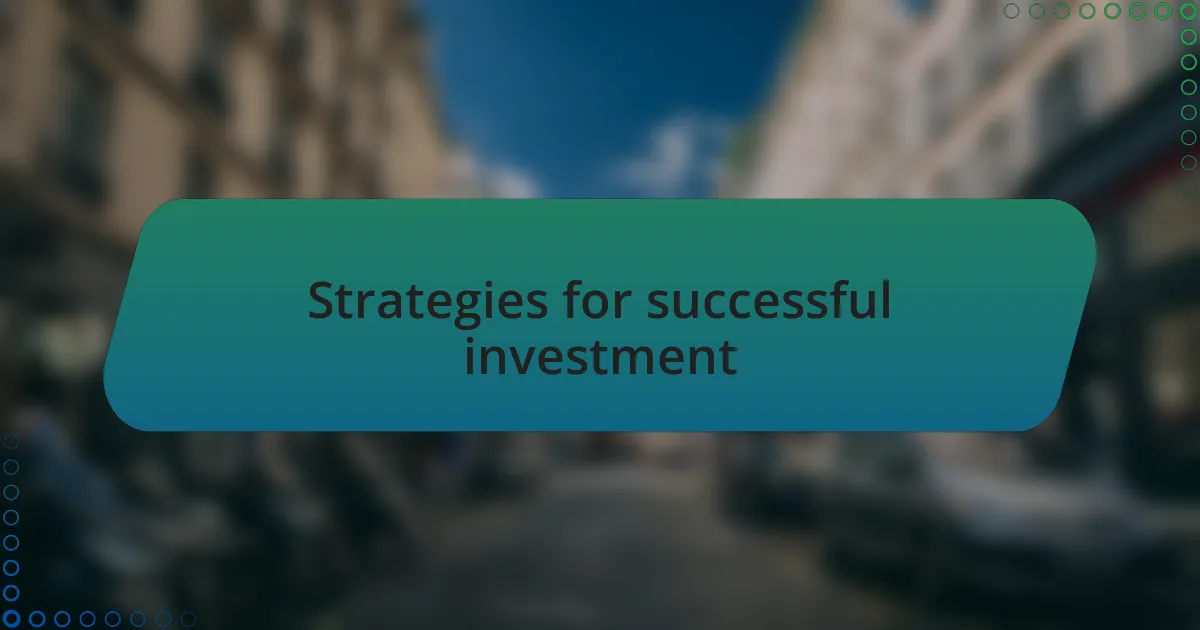Key takeaways:
- Investment consulting offers tailored strategies based on individual financial situations, helping clients navigate complex choices.
- Effective financial coaching emphasizes active listening, accountability, and the celebration of small wins to foster motivation.
- Developing a diversified portfolio and staying informed about market trends are crucial for successful investment strategies.
- Using the right tools for investment tracking, such as mobile apps and financial platforms, enhances financial management and decision-making.
Understanding investment consulting
Investment consulting is about providing expert guidance to individuals and organizations on where to place their financial resources to achieve their financial goals. I remember my first encounter with a financial consultant; it opened my eyes to the complexity and potential of investment choices. Have you ever felt overwhelmed by the sheer number of options available? A good investment consultant can help distill those choices into a tailored strategy.
At its core, investment consulting is not just about numbers; it’s about understanding your unique financial situation and aspirations. I’ve found that when consultants take the time to listen and empathize, they can craft strategies that feel deeply personal and relevant. Isn’t it reassuring when someone genuinely cares about your financial success?
Additionally, navigating the ever-changing landscape of markets and trends can be daunting. I’ve often reflected on how crucial it is to stay informed and adaptive. When consultants provide insights based on their expertise and ongoing research, it empowers clients to make informed decisions that can lead to long-term success. How much more confident would you feel knowing you have a knowledgeable partner in your investment journey?

Importance of financial coaching
Financial coaching plays a pivotal role in shaping a person’s financial outlook and future. I recall a time when a financial coach guided me through the basics of budgeting and saving. It was rewarding to witness how someone’s expertise could empower me to take control of my finances. Have you ever experienced that moment when everything just clicks, and you realize you hold the reins to your financial destiny?
Another significant aspect of financial coaching is accountability. When I worked with a coach, the regular check-ins pushed me to stay committed to my financial goals. It’s astonishing how a little external pressure can ignite motivation. Do you find it challenging to stay on course without someone holding you accountable?
Moreover, financial coaching provides a safe space to discuss fears and uncertainties surrounding money. I remember expressing my anxieties about investments, and it felt liberating to discuss these feelings openly. There’s immense value in having someone who not only educates but also empathizes with your financial journey. Isn’t it comforting to know that you aren’t alone in traversing the often convoluted world of personal finance?

Key principles of effective coaching
Effective coaching hinges on active listening. I recall a session when my coach focused intently on my concerns rather than jumping into solutions. This approach made me feel valued and understood. Have you ever noticed how powerful it is when someone genuinely hears your worries, allowing for deeper exploration of your financial aspirations?
Another crucial principle is tailored guidance. Each person’s financial journey is unique, and I’ve learned that a one-size-fits-all strategy rarely works. When my coach adapted strategies specifically to my circumstances, I felt a sense of trust and collaboration. How might your financial decisions change if they were backed by personalized advice?
Moreover, celebrating small wins is fundamental. I remember how my coach encouraged me to acknowledge each milestone, no matter how minor it seemed—like saving my first $1,000. These celebrations fueled my motivation and reinforced the progress I was making. Doesn’t recognizing those achievements make the journey feel more rewarding?

Strategies for successful investment
Developing a diversified portfolio has proven to be a game-changer in my investment journey. I remember when I invested heavily in a single stock, only to watch it plummet. It was a wake-up call that pushed me to embrace a mix of assets. Are you giving enough thought to how various investments can buffer against economic downturns?
Additionally, staying informed about market trends is crucial. There were times I found myself overwhelmed by conflicting advice from different sources. But over time, I learned the importance of filtering information and focusing on reliable data. How do you make sense of the financial noise surrounding you?
Another effective strategy is setting clear, achievable goals. I often revisit my financial objectives, adjusting them as my circumstances change. For instance, I started with a modest target of saving for a vacation, but that evolved into a long-term plan for retirement. What goals are you currently working towards, and how do they shape your investment decisions?
![]()
Tools for investment tracking
When it comes to investment tracking, I can’t stress enough how essential it is to use the right tools. I started using a simple spreadsheet to manage my investments, which quickly evolved into something much more sophisticated over time. Have you ever considered how a well-organized tracking system can help you stay on top of your financial performance?
I also found mobile apps like Robinhood and Personal Capital to be game-changers. They not only allow for real-time updates on my investments but also provide intuitive dashboards that make it easy to visualize my asset allocation. How often do you find yourself checking in on your portfolio, and could a dedicated app simplify that process for you?
Finally, integrating tools like Yahoo Finance or Google Finance into my routine has truly enhanced my investment game. These platforms allow for customized alerts on price changes and market news, which helps me stay proactive instead of reactive. Reflect on the tools you currently use; are they empowering you to make informed investment choices?

Personal reflection on my journey
As I reflect on my journey through financial coaching, I remember how transformative my first coaching session was. It felt surreal to have a professional dissect my financial habits, revealing blind spots I didn’t even know existed. Have you ever experienced that moment when someone helps you see things from a different perspective? It opened my eyes to patterns I’d overlooked, and that realization sparked a profound shift in my approach.
Later, I encountered my fair share of skepticism. Doubting whether coaching could really align with my financial goals led me down a path of experimentation. I recall a particularly tough conversation with my coach about potential investments that made me question my risk tolerance. It was uncomfortable but necessary; that balance between safety and opportunity is something I still grapple with today. Have you felt that tug-of-war when making investment decisions?
Looking back, I see how my relationship with my finances matured over time, shaped significantly by coaching. It wasn’t just about numbers; it was about understanding my emotional connection to money. There’s a sense of empowerment that comes when you take control, isn’t there? I’ve learned to embrace discomfort, and it’s the moments of challenge that have helped me grow the most. What pivotal experiences have shaped your financial journey?







